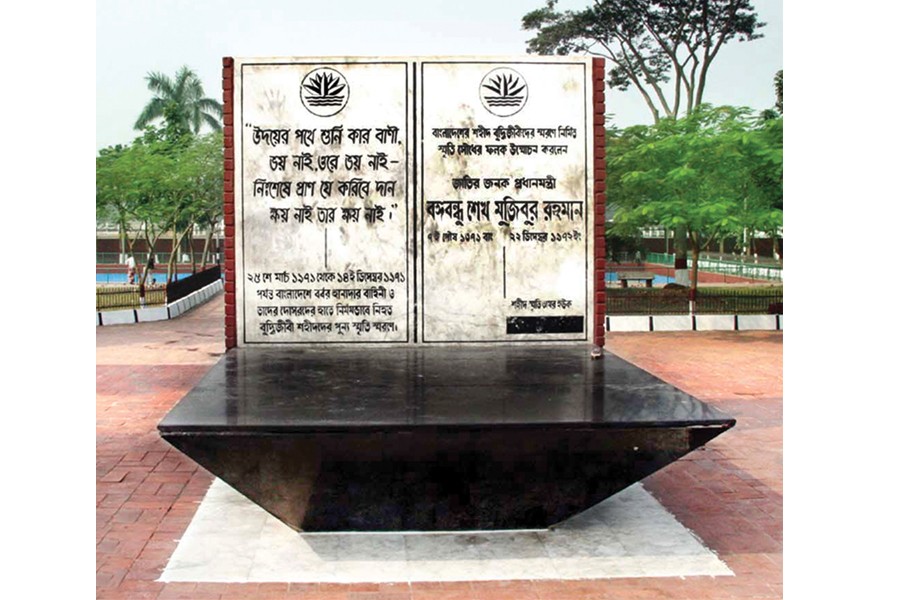The nation is set to observe the Martyred Intellectuals' Day today (Thursday) in a befitting manner, reports BSS.
On this day 46 years ago, on the eve of the nation's victory, the marauding Pakistan army in collusion with their local quislings - the Al-Badr, Al-Shams and Razakars - killed the most prominent intellectuals of the country in a bid to cripple the newly emerging nation of Bangladesh.
A memorial erected in memory of the martyred intellectuals at Mirpur in the capital has been readied as national leaders and people from all walks of life will offer tributes by placing wreaths there.
The Pakistani troops and their Bengali-speaking collaborators belonging to Razakar or other auxiliary forces killed a number of intelligentsia throughout the nine-month long Liberation War.
But they visibly engaged the infamous Gestapo like Al-Badr and Al-Shams forces on December 14, 1971, just two days ahead of the final victory, to carry out a systematic campaign to murder the most regarded academics and professionals like doctors, engineers and journalists visibly to expose the newborn nation to a state of brainlessness.
The then Bangladesh government and victorious freedom fighters, however, came to know about their last brutal massacre only after the December 16, 1971 surrender by the Pakistani troops when their top accomplices mostly belonging to Jamaat-e-Islami and its student wing went into hiding to resurface years later.
Those who were exposed to the killers' wrath on December 14, 1971 included Dr Alim Chowdhury and Dr Fazle Rabbi, Journalists Shahidullah Kaisar, Sirajudddin Hossain, Nizamuddin Ahmed, S A Mannan and Selina Parveen and Litterateur Monier Chowdhury.
Most of the December 14 victims were picked up from their houses blindfolded and killed between December 10th and 14th in 1971.
Bangladesh this year observes the day with a sense of relief from the stigma of impunity as the top assassins, who managed to make their room in the national politics with the patronage of influential vested quarters which emerged after the August 15, 1971 assassination of Bangabandhu Sheikh Mujibur Rahman, were hanged.
Al-Badr chief Motiur Rahman Nizami and his second in command Ali Ahsan Mujaheed, who subsequently became Jamaat's ameer and secretary general and ministers in the past BNP-led four-party coalition government were hanged after trial as major war criminals.
President Abdul Hamid and Prime Minister Sheikh Hasina issued separate messages on the eve of the day paying glowing homage to the martyred intellectuals.
Marking the day, ruling Awami League and other political parties and different cultural and social organizations have chalked out various programmes.
Awami League will hoist black flags and keep the national and party flags at half-mast at Bangabandhu Bhaban and its Central Office and all party offices across the country at the dawn.
The party leaders and activists will place wreaths at Martyred Intellectuals Memorial at Mirpur at 7.15 am and at the portrait of Father of the Nation Bangabandhu Sheikh Mujibur Rahman in front of Bangabandhu Bhaban at Dhanmondi 32 at 7.45 am and Rayerbazar Killing Ground at Mohammadpur at 8.30 am.
Different political, professional, social and cultural organizations, including Jatiya Press Club, Dhaka Reporters Unity, Bangabandhu Gabeshana Parishad, Jatiya Party, Jatiya Samajtantrik Dal, Communist Party of Bangladesh, Bangladesh Shilpakala Academy, Bangla Academy, National Museum, Bangabandhu Parishad, Sammilito Sangskritik Jote, Sector Commanders' Forum and Liberation War Museum, also have chalked out elaborate programmes to observe the day.


